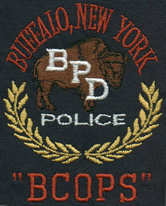Police and Stress
Posted on by
There are approximately 861,000 police officers in the United States (http://www.bls.gov/oco/ocos160.htm). By the nature of their jobs, many police officers face tremendous stress on a daily basis. Research has shown that police officers are at increased risk for cardiovascular events and may face an increased risk for suicide. Yet, police officers are in general an understudied occupational group. The National Institute for Occupational Safety and Health (NIOSH), together with colleagues at the University at Buffalo (UB), is studying the effects of policing and stress on adverse metabolic and early stage (subclinical) cardiovascular outcomes with the ultimate goal of preventing these and other stress-related disorders.
Researchers are using a physiologic measure of stress, salivary cortisol (often called the “stress hormone”), to assess whether stress is associated with adverse metabolic outcomes (e.g., glucose intolerance and metabolic syndrome—a clustering of metabolic abnormalities including elevated waist circumference, triglycerides, blood pressure, fasting glucose, and reduced HDL cholesterol) and subclinical cardiovascular outcomes (e.g., decreased brachial artery response, increased carotid artery wall thickness, decreased heart rate variability) that are detectable before they manifest as disease such as diabetes and myocardial infarction.
To date, over 400 police officers have participated in the Buffalo Cardio-Metabolic Occupational Police Stress (BCOPS) study. The clinical examination includes a series of questionnaires, which measure demographic, lifestyle, and psychological factors (e.g., depression, post-traumatic stress), DEXA measurements to record bone density and body composition, ultrasounds of the brachial and carotid arteries, 18 salivary cortisol samples throughout the day and in response to a series of challenges, and blood samples. Upon completion of the clinical exam, officers are given an actigraph, a small electronic device that resembles a wrist watch, to wear over the next 15 days that measures the quantity and quality of sleep throughout their typical police shift cycle.
In addition to this effort, NIOSH and the National Institute of Justice within the U.S. Department of Justice have extended the BCOPS Study by measuring police officer fatigue and the impact of fatigue on officer health and performance. A unique feature of this study is the utilization of both objective sleep quality measures (obtained by the actigraph) and daily work history records which date back to 1960. These measures will allow researchers to assess the effects of shift work and extended work hours on officer stress and fatigue, and examine the effects of work-related stress and fatigue on cardiovascular and metabolic disease risk.
While there are many unique features of this study, the partnership that exists between the UB Principal Investigator Dr. John Violanti and the Buffalo Police Department Administration and Union has greatly contributed to its success. Recognizing the tremendous value the study findings could have on police officer safety and health, these groups have worked closely together to increase visibility of the studies and encourage the officers to participate. Additionally, as a retired New York state trooper, Dr. Violanti brings unique insight and maintains a sense of credibility among the officers.
Another feature of our research has been the success of two previous cross-sectional pilot studies involving a smaller number of Buffalo police officers. Findings include the following:
- Female officers had higher mean Impact of Events (a measure of post-traumatic stress symptoms) and CES-D (a measure of depressive symptoms) scores than male officers.
- Officers with higher post-traumatic stress disorder (PTSD) symptoms had a nearly two-fold reduction in brachial artery flow-mediated dilation, indicating greater impairment of endothelial function (physiologic dysfunction of the normal biochemical processes carried out by the cells which line the inner surface of blood vessels) than officers with fewer PTSD symptoms.
- Officers with moderate or severe PTSD symptoms had higher mean awakening cortisol values compared with those who had less severe PTSD symptoms.
- Officers with severe PTSD had a three-fold higher prevalence of metabolic syndrome than those reporting the fewest PTSD symptoms. This association was attenuated slightly by covariate adjustment for age and education.
- Additional findings include associations of negative life events with depressive symptoms (Hartley et al.), night shift work with short sleep duration and snoring (Charles et al.), and a series of statistical applications for optimizing the measurement and analysis of study exposures or outcomes (Andrew et al., Fekedulegn et al., Slaven et al.).
Currently, we are continuing to examine police officers as part of our study of the entire Buffalo Police Department. We look forward to sharing our results with you in the future. The complete results of this research may be applicable not only to police officers but to other first responders who also consistently place their safety and health on the line. Additionally, the information gained from this research may increase understanding of how stress in all workplaces might lead to adverse health outcomes.
We are interested in hearing from police officers, police administration, police unions, law enforcement planners, other emergency responders, and investigators focused in this area of research. Your input will be valuable in the design of future studies in this area.
- What are the key stressors involved with police work?
- How should NIOSH share our future results with law enforcement agencies throughout the country (e.g. workshops, print media, Web sites)?
- What types of interventions would be feasible in the future to 1) decrease work-related stress and 2) improve cardiovascular health among police officers?
Thank you for your assistance,
Tara A. Hartley, MPA, MPH, Cecil M. Burchfiel, PhD, MPH and John M. Violanti, PhD
Ms. Hartley is an Epidemiologist in the Biostatistics and Epidemiology Branch, and Dr. Burchfiel is the Project Officer and the Chief of the Biostatistics and Epidemiology Branch. They are located at the NIOSH Health Effects Laboratory Division, Morgantown, WV. Dr. Violanti is the Principal Investigator and is an Associate Research Professor in the Department of Social and Preventive Medicine, School of Public Health and Health Professions at the State University of New York at Buffalo, Buffalo, NY.
Posted on by

